“I remember thinking as a kid: I can’t wait till I grow up,” says Paul Thomas Anderson. “I can’t wait till I get older and I can shed all this stuff, and all the answers will be there for me.”
America’s best director is now 51: salt-and-pepper hair, still as loose-limbed as a student. Those answers are yet to materialise, he says, grinning. “No one sets you up for that. My dad never said: ‘Oh, by the way, it’s going to get a lot more complicated and a lot harder.’ Or: ‘Being in love and having a relationship is going to be the most difficult challenge of your life.’ I don’t know why. Maybe it was just my dad.”
Dissent from down the sofa: Alana Haim, the rock musician who stars in Anderson’s new movie. “Ignorance is bliss!” she cries. Nobody told her that stuff either – of course not. “Parents just want a happy kid.” They laugh: not quite father-daughter, but close.
It’s a freezing morning in November, back before Omicron, when film stars still flew to London for screenings and even took off their masks to speak. Outside the window, a neon fawn is strung between lampposts in Covent Garden. The promise of a proper Christmas glints in the air.
Licorice Pizza, too, is a nostalgia trip: romantic, relaxed, exhilaratingly cinematic, stuffed with big skies and unvarnished closeups that seem even more amazing after two years starved of the faces of strangers. Better than Boogie Nights – Anderson’s other film set in the 70s San Fernando Valley of his youth. Less epic than There Will Be Blood. But light years from the heaviness of The Master, the mad tangle of Inherent Vice, the couture austerity of Phantom Thread.

Shooting that movie in London five years ago prompted its star, Daniel Day Lewis, to quit not just method acting but the profession for ever, and left its director depressed. Small wonder he made his next movie at home, with friends who had never acted before.
Haim and Anderson met nearly a decade back when he emailed her and her sisters to see if they might like him to direct any of their music videos (yes, they replied, and did he realise their mother was his old high-school art teacher?). Her co-star, Cooper Hoffman, is the eldest child of Philip Seymour Hoffman, who died aged 46 in 2014, the year after he was Oscar-nominated for The Master, his fifth Anderson movie. “I’ve known Cooper since he was a baby.”
Now 18, Hoffman plays Gary Valentine, a 15-year-old former child actor and budding entrepreneur: positive, charismatic, irrepressible. Haim is Alana Kane: 25, abrasive, immature, directionless. They meet. Gary makes a move and, loathing herself for it, she shows up to supper with him.
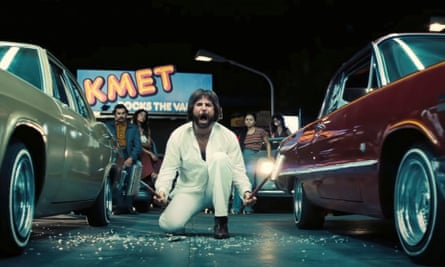
The film charts their friendship over a year: him smitten and her, mostly, resisting. She chaperones him on a trip to New York. They set up a business selling water beds. There are tiffs and splits. Disaster is a frequent tease – false arrest, terrorist scare, some very hairy driving. But cliches are always dodged, right down to the visible acne and the DIY makeup. The leads look outlandish because they look real.
Splattered through the story are fabulously hammy big-name cameos. Bradley Cooper as a coked-up Jon Peters, the hairdresser and then-boyfriend of Barbra Streisand. Sean Penn as an egomaniacal A-lister modelled on William Holden, who hits on Haim by intoning random dialogue from his old war movies. Tom Waits as a wild, delusional director. Harriet Sansom Harris as a quivering theatrical agent. John Michael Higgins as a restaurateur who addresses his Japanese wife in a thick east Asian accent, as he himself doesn’t speak the language.
This mix – Bresson meets Ferrell – was intentional, says Anderson. “It works because it comes about at the right time. The relationship reaches a certain type of peak and the needle needs to move. They have a fight and then a movie star emerges playing a movie star. It’s not a sharp turn that takes you out of the story. Hopefully it feels quite natural.”

“Paul is attracted to actors and trusts them,” says Higgins down the phone a few weeks later. “Real technicians with long résumés, but also people who have no experience. He has an innate feeling there will be emotional information as a result of that contradiction.”
Emotional information? “The audience can say: ’That’s me. I see me. This is right, this is real, this is what people are like.’ They’re not easy to explain.”
“It feels very much like you’ve been invited over to play,” adds Harris, also down the line. “That’s the best feeling an actor can have and not everybody who has power understands that.” She had barely met Anderson before turning up on The Phantom Thread, yet “he acted as if I was an old college friend and he was so glad I was there and now we can do this. His leadership is implicit. The ideas are him. He never has to swagger around and act like he’s the boss.”
I blather on about how I’ve always found him surprisingly approachable. Yes, she says, isn’t he fun? And sets are full of love and momentum. Then comes the kicker, a dry flash of Bebe Glazer: “But he could behave any way he wanted. I don’t think his repertoire is limited. I think he knows how to get the best out of people.”
Be it opportunism or diplomacy, Anderson – the great auteur – seems increasingly eager to evolve into the ether. On set, he says, he wants to disappear as completely as possible (not beforehand, mind: for all its pinball plotting, the script for Licorice Pizza is the most exact he says he has written).
Today, he loves reeling off examples of his own redundancy. When Haim binned an “over-wordy” scene in favour of just demanding someone tell her whether he’s circumcised.
Anderson cackles. “That moment of joy when you’re not a writer any more, when you’ve set a table for someone and they are devouring the meal and running with it. There’s not a moment where I would say: Cooper, stop, you’re improvising too much. You hope to get to a place where anything you’ve written isn’t needed any more.”
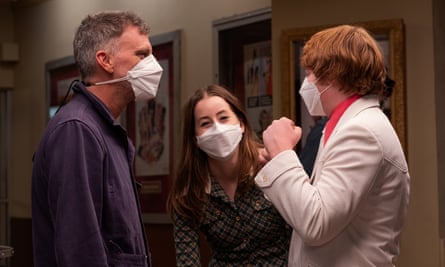
Another time, he wanted Alana to lose an argument for the sake of the narrative arc. “She was incapable of doing that. Take after take, I said: ‘I know it feels strange, but please, I really need you to do this.’ I’m the director, who’s in charge! She’d never done this before! I’m demanding she loses the fight.
“She refused! And eventually I realised – you’re trying to impose this thing which is never going to happen. Clearly, I’m steering in the wrong direction. Whatever dream you had for your movie is gone. I was so proud. Don’t listen to my horseshit. It was kind of magical.”
Carefully orchestrated passivity is Anderson’s genius, thinks Higgins. “Paul is really interested in observing things and reporting them back to us. For all his brilliance, there’s a matter-of-fact quality to his films: look at this and this, and now this. It’s kinda simple. There’s not a lot of ideas flying around. It’s what he sees. The audience is the one who is burdened by ideas.”
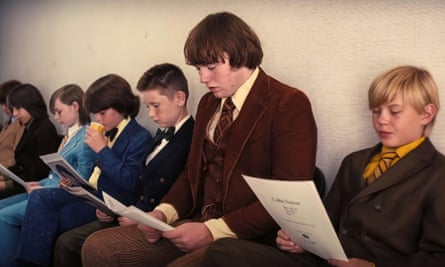
Anderson has made instant stars of Hoffman and Haim. But – he’d presumably protest – only insofar as he simply noticed them. “I’ve cast actors to come on and say, ‘Would you like more coffee’ and they freeze up. There’s absolutely nothing that I can say to help them. Saying lines like you made them up is a skill that you either have or you don’t.
“If you don’t believe me, try it one day. It’s really, really, really, really hard to say the simplest things in a natural way, particularly when there’s a camera and people around, and to do it time after time. It’s a very rare skill few people have. It would be incorrect to think I’m responsible beyond just creating a nice situation.”
(Haim’s nice situation turns out to have been a two-month course in driving massive old lorries, in aid of one scene – and to stop her sitting at home and getting cold feet. “Stop worrying about the acting! Worry about guiding a 10-tonne truck backwards down a hill.”)
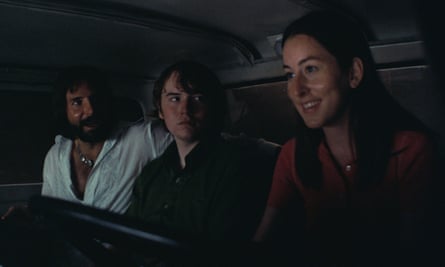
Both Haim and Hoffman have been Golden Globe nominated, Anderson too. Oscars will follow. The gamble has paid off. But what if it hadn’t? Given the family ties, the personal history, their youth: how did Anderson handle such high stakes?
“Delicately, compassionately, with an enormous amount of thought and protection. Just don’t treat it lightly.” He pauses. But also, do treat it lightly. “We take the work seriously, but we don’t take ourselves seriously and we want it to be simple and we want it to be fun.”
Still, Anderson and Haim are the ones doing all the press, with Hoffman carefully protected. Haim – once his babysitter – proves as tough a bodyguard as her boss. “Me and Cooper are two peas in a pod,” she warns with a smile. “Us against the world. With Paul.”
In the film, Harris’s character, finally getting the measure of this potential new client, tells Alana: “You remind me of a dog. Of an English pitbull dog, with sex appeal and a very Jewish nose.”
Not brutal, just helpful, thinks Harris. “I know people who talk like that. One agent said to me: ‘How do you feel about my wrinkles?’ It’s somebody giving you a chance – are you aware? Have you thought of this?”
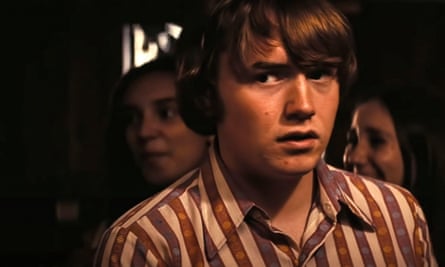
Haim likes the idea that she is a beast to be unleashed. “I’m very territorial when it comes to the people that I love. I love very hard and if you’re in my family, I will do anything to protect you. Cooper is basically my family now. I would do anything for him. I can be very sweet, but you don’t want to mess with anyone that I love.”
“That line is how I would describe Alana,” says Anderson. “And that is a compliment. I love pitbulls. I have had many of them. They are fantastic dogs and they have this reputation as being these killers but it’s not true at all. They are the most intelligent, loving, generous companions. And if they decide to kill you, they will kill you and they will not stop.”
He has watched his own dog kill a smaller dog (“too tragic to talk about”); less fun, he says, than watching Haim “protect and snap”. “I want that person on my side because they are moving through this world and very generous and very alive and very welcoming, but with a very strong point of what is OK and what is not OK.”
Punchy, ballsy, broad-shouldered despite her slightness, Haim seems a fitting woman to be Anderson’s first female lead (Licorice Pizza shares some DNA with Punch-Drunk Love, not least having Hoffman Senior as a mattress salesman, but Emily Watson was still second fiddle to Adam Sandler). What is strange is that Anderson himself, for a father of four who has specialised in movies about masculinity, seems so feminine. “That’s nice of you to say,” he says, gently. “I will tell that to my sisters. They will love that.”
Yet his film is less simple when it comes to gender. The three sisters, for instance, are shown as fractious, needling, difficult. The boys, meanwhile – Gary, his nine-year-old brother and the troupe of friends they hang out with – are collaborative, loving and can-do. Is that generally the case?

“Sometimes you love each other,” says Haim. “Sometimes you don’t. I grew up in a household with three girls sharing one bathroom.” In the film, all three are still living with their parents, “well past when they should be”, says Anderson (three sisters his age, four older brothers). “The boys are running free, free of supervision to roam the streets.”
So perhaps it’s less about a gender divide than two types of parenting: one top-heavy, the other over-light (Gary’s father is unseen, his mother overworked and often absent). It’s not hard to decipher which product of these approaches is presented as better-adjusted. Is Gary a child of the 70s, Alana someone who could have been raised today?
Yes, says Anderson. “Kids today have far less independence. Even if they have the illusion of independence, their parents are still tracking their movements on their telephone. There’s no mystery any more for these kids about where another person is or where their friends are.”
“I think it’s a very accurate representation of that very romantic time. You could just go! Go ride your bike, go to the movies, go do something, get out of the house, go away!
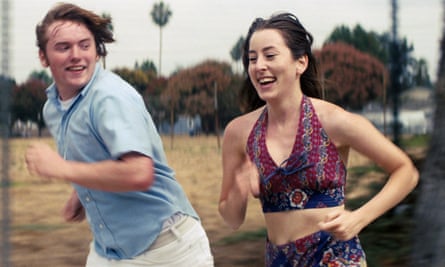
“I don’t think we’re doing kids any favours. I’m desperate to give my kids even more independence, but it’s not just up to me. I’m only 50% of that vote. I think most parents feel more comfortable to know just where their kids are at all times. It makes me feel a little bit uncomfortable, like big brother. I don’t need to know, especially if they are doing well and I trust them or they have to venture out and find trouble or find mischief. I want to encourage them …”
To find mischief?
“Of course. Sure. Hopefully the good kind.”
Licorice Pizza luxuriates in a time of freedom and chaos and danger, even if that threat never quite materialises. “Paul’s movies are like that too,” says Higgins. “They don’t quite follow the screenplay rules. They are totally individual and parentless in themselves.”
Yet some have accused the director of using that period setting to smuggle through stories that would be unacceptable today. Some feel the Japanese restaurant scenes leave a sour taste; plain anti-Asian, not smart satire.
“It’s a period piece,” protests Higgins. “It’s nice to see how far we’ve come. I play a lot of characters who are less enlightened than I am. It’s a work of art, not of politics. When we start cherrypicking behaviours that were unacceptable then we’re starting to get into trouble.”
Others have criticised the central romance as predatory, paedophilic even, on account of the age gap. So, did he set it 50 years ago to set some distance?
Anderson hmms. Actually, he tried to talk himself out of setting another movie back then. The transfer of other elements jarred. Gary’s ambition, mostly. “He wouldn’t be selling water beds; would he be in advertising? Doing YouTube or reviews on TikTok? These things seemed unappealing to me and not very cinematic.”
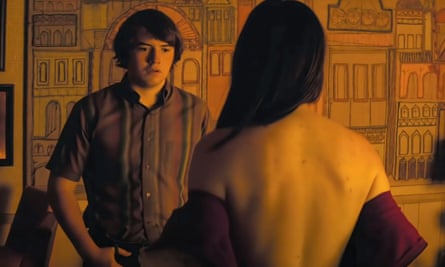
He pauses, question unanswered. “I’d have to think longer and harder. Does the 70s setting soften the blow? For sure, if you look back at something, it’s another time. Perhaps it places it just out of reach. But it would still be exactly the same dynamic, which is a classic device of any screwball comedy: two people bound to each other with an impossible obstacle.”
Has he ever thought about what it would be like gender-flipped?
“I don’t want to spend too much time thinking about that. What would the point be in that exercise? What would it look like? I wonder.”
Less funny?
“Probably. It’s nice to know what the parameters are in a relationship because then you can get on with the business of the story. You can get on with all the stuff that concerns you. All the sticky stuff.”
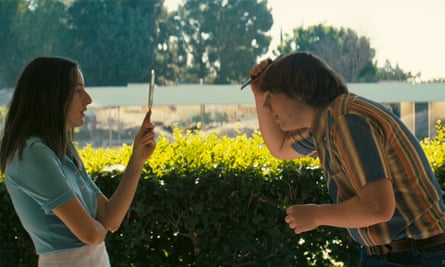
Haim adds backup. No, it didn’t concern her. “We were very delicate with everything.”
It’s hard to argue. The lust is all Gary’s; eyeing up Alana as she sleeps, livid she won’t show him her breasts. It’s a film of subtle leg brushes, fingers touching, sweetness and running. Sure, it’s the 70s, but it’s miles more Love Story than Deep Throat.
“You see all these sort of pre-Hays Code films from the 30s,” says Anderson, “and they are meant to be so naughty. And they are touching a little bit closer to something, but they are still well-mannered because they know what’s right and what’s not.”
Maybe one day he’ll work it out too. Maybe one day he’ll be old enough. So far, though, he sighs, not unhappily, ageing is “just swimming out to sea. You think you’re going to get to this other shore that will magically have all the answers. It turns out you’re just swimming further away from the shoreline and seeing it disappear behind you. And you wonder, wow! Pretty far out here. I’m pretty far out on life’s limb.”
So how do you stay afloat? “Keep treading water! Look for somebody else to hold on to.” When did he last think he was drowning? “This morning! No. No, I’m not one who thinks he’s drowning. I’m more someone who thinks: enough with the water already.”

Comments (…)
Sign in or create your Guardian account to join the discussion